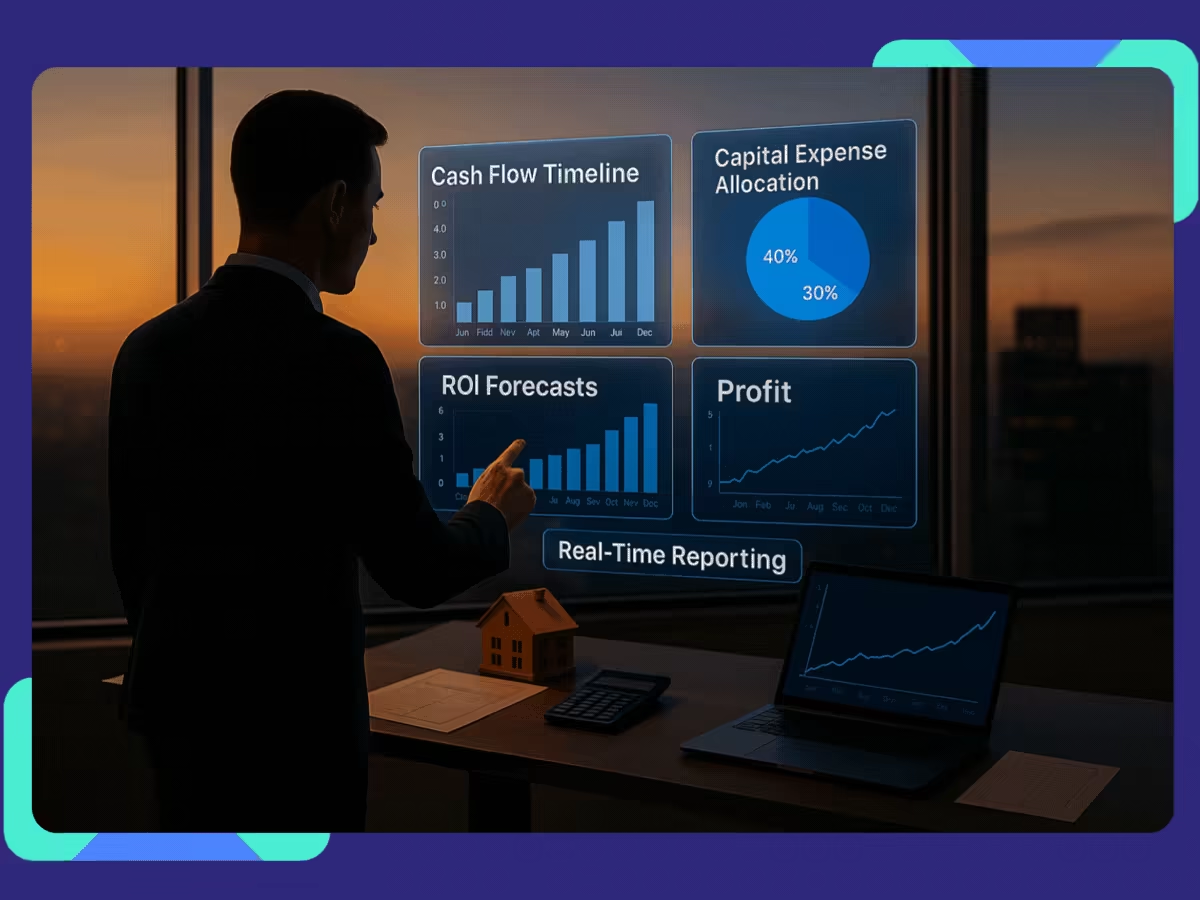Table of Content
Share This Article
- Published: May 16, 2025
- Last Updated: Jun 20, 2025
- 🔊 Listen
Quick Reads
- Real estate businesses require tailored accounting software to manage complex projects, track tenant payments, and handle property-specific expenses effectively.
- Specialised real estate accounting software automates routine tasks like improving efficiency, reducing errors, and enabling them to offer more strategic financial analysis.
- Real estate developers benefit from accounting software with project-based features for tracking costs, budgets, and revenue, leading to better cash flow management and informed decisions.
- Property managers experience streamlined financial operations through software that automates rent collection, manages security deposits, and provides centralised income and expense monitoring.
- Choosing the right accounting software for real estate is crucial to automate complex transactions, manage properties efficiently, and ensure full compliance.

Real Estate Ledger Help
Outsource your books, focus on properties that pay.
Tired of wrestling with a spreadsheet or generic accounting software that doesn’t quite fit your real estate business? You are not alone. Managing complex projects, tracking tenant payments, and handling property-specific expenses demands a tailored solution. This blog will explore the top real estate accounting software, highlighting its key features and helping you choose the one that will best support your business’s success in the coming year.
Top 5 Accounting Software for Real Estate Business
Whether it’s streamlining finances, managing property portfolios, or ensuring transactional accuracy, choosing the right accounting software can be invaluable. Here is a list of the top 5 accounting software for real estate businesses, with a focus on what each of them offers specifically for real estate operations:
NetSuite
NetSuite offers a comprehensive cloud ERP solution ideal for real estate accounting firms managing multiple developments or rental portfolios. It simplifies lease accounting, automates VAT compliance, and consolidates financials across sites, making it easier to stay HMRC-compliant and investor-ready.
Key Features:
- Real-time financial visibility across properties
- Automated lease accounting
- Supports UK VAT rules and MTD (Making Tax Digital)
- Multi-entity and multi-currency consolidation
- Built-in project cost and budget tracking
- Customisable dashboards for property managers and CFOs
QuickBooks
QuickBooks is a widely used cloud-based accounting software for real estate professionals who are managing rental properties, fix-and-flip projects, or real estate agencies. The contractor edition in QuickBooks Desktop Premier supports job costing, helping users calculate profitability per property. You can also track mileage, expenses, and vendor payments. Moreover, QuickBooks Online integrates easily with property management tools like Buildium, making it a flexible option for both small investors and growing firms.
Key Features Include:
- Automated rent and expense tracking
- MTD-compliant VAT submissions
- Custom invoices for lettings and services
- Real-time cash flow insights and forecasts
- Bank feeds for easy reconciliation
- Mobile app access for on-the-go updates
Xero
Xero stands out as a trusted real estate accounting software which is helpful for property managers and real estate consultants who prefer a cloud-based, mobile-friendly solution. It allows real-time bank feeds, automated reconciliation, and tenant invoicing. Moreover, its sleek dashboard, custom financial reporting, and easy collaboration with accountants make it ideal for teams working remotely or on the go.
Key Features Include:
- HMRC-recognised for Making Tax Digital (MTD)
- Easy rent tracking and recurring invoicing
- Real-time bank feeds and auto-reconciliation
- Property-specific expense and income categorisation
- Mobile access for on-the-go updates
- Custom reports for cash flow, profit, and tax
Sage
Sage offers a strong product for the real estate sector with its Sage Intact, a cloud-based option with deep project costing, multi-entity financial consolidation, VAT compliance, and real-time reporting. This is the perfect accounting software for real estate investors, developers or asset managers. Also, it integrates seamlessly with property tools and supports Making Tax Digital (MTD). If your real estate business involves construction, long-term development, or asset-heavy operations, Sage offers industry-focused depth.
Key Features Include:
- Full HMRC compliance, including MTD and CIS
- Job and project costing for developments
- Advanced VAT management with UK-specific rules
- Multi-user access with role-based permissions
- Integration with payroll and contractor payments
- Scalable for growing property portfolios
Zoho Books
Zoho Books serves as an ideal real estate accounting software, best suited for growing real estate firms or independent property managers looking for an affordable yet capable system. Zoho Accounting software supports recurring invoices for rent collection, expense tracking, and VAT compliance. Moreover, you can create custom financial reports for individual properties and connect them to Zoho CRM to manage leads and clients from inquiry to closing.
Key features include:
- HMRC-recognised for Making Tax Digital (MTD)
- Automated rent invoices and payment reminders
- Property-wise income and expense tracking
- Built-in VAT filing and real-time audit trail
- Client portal for tenant communication and payments
- Integration with Zoho CRM and other Zoho apps

The Role of Accounting Software in Empowering Real Estate Professionals
Real estate accounting software is redefining how professionals across the industry operate, providing tailored solutions that simplify financial tasks, enable accounting automation, ensure compliance, and boost overall efficiency. Let’s explore how it impacts different roles within the real estate sector in the section ahead.
Real Estate Agents
For real estate agents, embracing specialised real estate software makes everyday work much easier. Instead of relying on spreadsheets or manual tasks, these digital platforms streamline core operations such as property listings, lead tracking, appointment scheduling, and contract management. This empowers agents to focus more on client engagement and closing deals.
Furthermore, with real-time access to market data, buyer insights, and integrated CRM features, agents can respond swiftly to opportunities and tailor their strategies to each client’s preferences.
You will find that many of the accounting software for real estate agents offer features like automated follow-ups, digital signature workflows, and mobile accessibility, making it easier to manage transactions on the go. Beyond mere convenience, these technologies enhance professionalism, reduce administrative load, and enable agents to build lasting client relationships.
Real Estate Developer
Real estate developers will find accounting software indispensable for managing the intricate finances of their projects. These platforms offer robust project-based accounting features, enabling developers to track costs, budgets, and revenue for each development in detail. This includes managing expenses related to land acquisition, construction, permits, and sales.
Additionally, the accounting software for a real estate company facilitates better cash flow management by providing tools for forecasting, tracking loan draws, and managing payables and receivables. With improved visibility into project profitability and performance through real-time data and customisable reports, developers can make more informed decisions, control costs effectively, and maximise their return on investment.
Property Manager
Property managers investing in robust real estate accounting software are automating crucial tasks such as rent collection and tracking, managing security deposits, processing vendor payments, and handling tenant invoicing.
Additionally, these tools provide a centralised platform to monitor income and expenses for multiple properties, generate financial statements, and ensure compliance with regulations related to tenant funds and reporting. Features like online payment portals enhance tenant satisfaction and improve collection rates. By automating these routine tasks, property managers can save time, reduce errors, and gain better insight into property maintenance, ultimately leading to more efficient and profitable property management.
Conclusion
Real estate businesses thrive on accurate financial tracking, streamlined operations, and timely insights. The right real estate accounting software can be the cornerstone of this success, automating complex transactions, managing properties, and ensuring full compliance. In 2025, with technology evolving and market demands intensifying, choosing a solution that aligns with your operational needs is more critical than ever.
At Whiz Consulting, we understand the intricacies of real estate accounting. Backed by over a decade of experience and a team of 100+ seasoned professionals, we help property managers, investors, and developers implement and optimise leading accounting platforms. Whether you need help integrating software, handling day-to-day bookkeeping, or generating investor-ready reports, our real estate accounting services deliver precision, efficiency, and peace of mind every step of the way.

Get customized plan that supports your growth
Have questions in mind? Find answers here...
Real estate accounting involves complex processes such as property management, lease tracking, commission calculation, and project costing. Specialised real estate accounting software streamlines these operations, ensures regulatory compliance, and enhances financial visibility tailored to the industry’s unique needs.
Look for integrated property management tools, leasing tracking, automated rent and payment processing, budget forecasting, and real-time financial reporting. Cloud access, AI-powered analytics, and mobile-friendly dashboards are also becoming essential.
Yes. Most modern real estate accounting software in 2025 supports API integrations with CRMs, leasing platforms, maintenance apps, and banking tools. This helps unify financial data with operational workflows for seamless decision-making.
Cloud-based solutions offer real-time access, scalability, and lower maintenance. In 2025, most industry leaders are leaning toward cloud platforms for their flexibility, multi-location access, and automatic updates.
Most modern solutions offer API integrations or native plugins that connect accounting software with property management platforms like Buildium, Re-Leased, or Arthur Online, creating a unified workflow.
Most vendors offer onboarding assistance, tutorials, and responsive customer support. While many platforms are designed to be user-friendly, systems with advanced features, like project cost tracking, portfolio-level reporting, or multi-entity management, may require a steeper learning curve. In such cases, hiring a dedicated real estate accountant can be invaluable. Not only can they help configure the software correctly from the start, but they also ensure your financial workflows remain compliant, efficient, and tailored to your specific business model.
Thousands of business owners trust Whiz to manage their account
Let us take care of your books and make this financial year a good one.
This website uses cookies to improve your experience. You can accept all or reject non-essential cookies.









